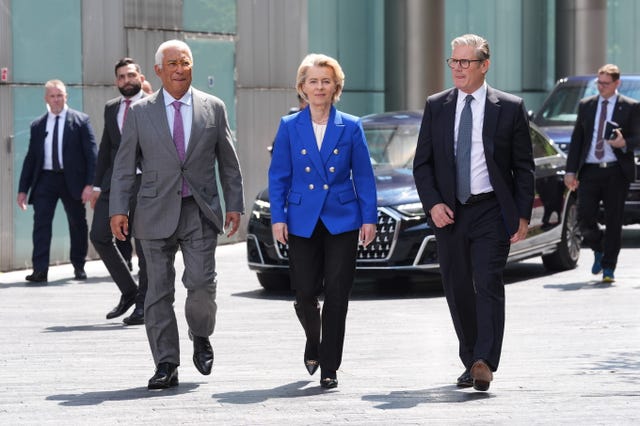Reeves says Gulf trade pact is Government’s ‘next deal’ after EU summit
Ms Reeves suggested economic growth would be strengthened through recent trade deals with the United States, the EU and India.

Chancellor Rachel Reeves said the Government is nearing a trade pact with six Gulf nations, including Qatar and Saudi Arabia, as its next major deal.
She told the BBC the agreement would be the Government’s “next deal” as it looks to continue to boost post-Brexit trade ties.
Ms Reeves suggested economic growth would be strengthened through recent trade deals with the United States, the EU and India.
“Britain is in a better place than any other country in the world in terms of deals with those countries,” she said.

“The first deal and the best deal so far with the US, we’ve got the best deal with the EU for any country outside the EU, and we’ve got the best trade agreement with India.”
The chancellor also said the UK was “not looking to have trade negotiations with China”.
In early April, Foreign Secretary David Lammy said Labour was continuing discussions with the Gulf over its trade deal, which were started by the previous Conservative government.
Ms Reeves’ comments come amid news of a new trade deal with Brussels struck on Monday.
The Prime Minister hailed his deal with the bloc, set out at a summit in London, as a “win-win” for both parties, which would be the start of a “new era” in the UK-EU relationship.
The wide-ranging deal will allow more British travellers to use passport e-gates when going on holiday to Europe, while farmers will get swifter, easier access to trade on the continent as a result of an agreement on animal and plant product standards.
A “youth experience scheme” allowing young Britons to study and live in Europe, and a new security and defence partnership were also agreed.
The Government claimed the post-Brexit “reset” will cut red tape for travellers and businesses, boosting the economy by £9 billion by 2040.
But it has been met with criticism after agreeing to grant European fishing trawlers a further 12 years’ access to British waters.
Sir Keir Starmer hailed a “mood change” in the relationship with the bloc, saying: “The EU and the UK wanting to work together, all of us prepared to say let yesterday be yesterday, we are looking forward to tomorrow.
“We are not going to litigate old arguments, we are going to go forward in the spirit of what we do together, we do better.”
Sir Keir was earlier accused by the Conservatives of having “surrendered” many of the gains they negotiated post-Brexit.
Kemi Badenoch said: “This deal will mean Britain becoming a rule-taker, accepting dynamic alignment, giving up fishing rights and paying new money to the EU.”
“Nobody has lost more than the fishermen,” as a result of the deal, she also told reporters.





